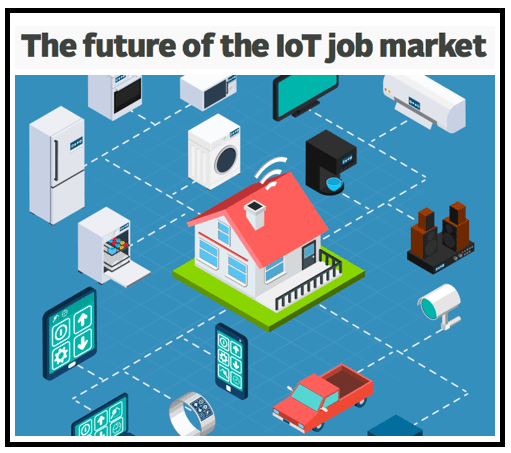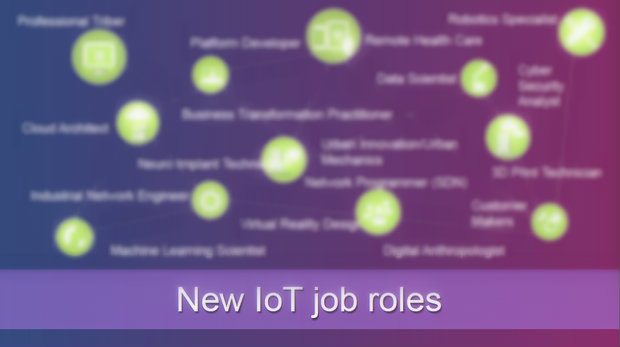We are living in a very fast paced world. We wake up in the morning, and are in a rush to get to the office, from there we are in a rush to get home. We sleep less and focus all our energies into developing ourselves. We develop ourselves and just hope that we are working in the right direction. These ‘developers’ hone their skills with hopes of being successful in their field, without any assurance of the particular skill having a good scope in the next five to ten years. Let’s take a look at the IoT industry, so you have a better idea what the required skills are for IoT jobs.
The IoT requirement
 Internet of Things (IoT) seems to be the hot market associated with data analytics. Anything that you can connect to the internet is essentially the Internet of Things. With international access to internet at about 3.2 billion and counting, it relates to increasing career prospects. IoT is a still developing field with additions being made on a regular basis.
Internet of Things (IoT) seems to be the hot market associated with data analytics. Anything that you can connect to the internet is essentially the Internet of Things. With international access to internet at about 3.2 billion and counting, it relates to increasing career prospects. IoT is a still developing field with additions being made on a regular basis.
All the data that you see in print or the digital world, is being compiled and made meaningful by man-machine collaboration. This calls for specialization in the field of digging through the relevant data to compile a meaningful report. Hence data analytics seems to be the field with a large amount of IoT jobs scope, since people always require meaningful data to work with, in order to achieve something else.
The added advantage for IoT jobs, is the integration of hardware and software skills. There is still a difference, but now a person working on software can develop working interest in hardware and vice-versa. Until the IoT dust settles, there is going to be a lot of such confusion as people are going to be changing roles,
Contributors to the report:Dr. Milind Kulkarni, director engineering institutes, ITM group Siddarth Bharwani, vice president, Jetking Infotrain Limited Hrishikesh Kamat, chief executive officer, Shalaka Technologies pvt. ltd. |
The current situation
According to a report by VisionMobile, “61% of wearable developers work in relatively small companies of less than 50 employees.” This comes as good news for people having doubts with regard to small organisations. Not just small organisations, “the number of developers working alone (20%) are surprisingly high.”
Being a part of this change is very easy. The VisionMobile report also suggests the number of IoT applications developers to increase five-fold over the next five years.
According to TechGig Code Gladiators – a coding contest organised by techgig.com, Java, C and C++ came up as the preferred language for programmers. Bengaluru, Pune, Hyderabad, Chennai, Delhi and Mumbai were the top source of contestants.
Specifics for IoT jobs
“Engineers with multidisciplinary skills are in high demand,” explains Dr. Milind Kulkarni, director engineering institutes, ITM group. According to the market, big data analytics and cloud skills are important because IoT sensors tend to send large amounts of data in real time. But the most important skills developers need, for IoT jobs, is proficiency in cloud, mobile and data analytics. Just being conversant in one skill is not enough anymore. The expertise on the trifecta would govern the salary and status with time.
IoT requires dedicated hardware and this creates a large requirement for developers with knowledge of embedded systems. Embedded system hardware and software have to be continually updated, calling for efficient development. Development skills get you started whereas creativity would keep you going.
Considering the hardware
Manufacturing hardware, adds a certain level of complexity, so as a developer, refining some of those skills in hardware, is likely to add to the skill set. This will definitely be an advantage for someone searching IoT jobs.
IoT relates to connecting every device to a network. A very large number of these connections require sensors and dedicated hardware development. The current sensors include, “vibration, RF, temperature, humidity, pressure and many more” lists Hrishikesh Kamat, chief executive officer Shalaka Technologies pvt. ltd. A dedicated hardware learns from every recorded activity. “The system can learn and update after every activity,” adds Kamat.
Automation also covers a lot of opportunities in both product and service oriented industries. According to Siddarth Bharwani, vice president, Jetking Infotrain limited, “researchers, robotics system engineers, senior robotics specialists, analysts, trainers, robotics technicians, supervisors and assistant engineers in the design and application of robot systems,” comprise the major opportunities.
A lot of confusion in software
Software development is an area that requires fine tuning. Decision towards a particular technology can be made fairly easily once we have a higher number of devices. According to some industry experts, C programming, JavaScript and PHP skills should be in demand. These comprise the most basic in development and hence would provide a better way to work the system.
Some other experts believe, IoT development could see demand in Java, Android, CSS and JavaScript skills. Techgig corroborates this data w.r.t the language options. This sector is however limited to website development and management.
Cyber-security experts
With such a connected world, another matter of concern is security. A study by HP Fortify conducted in 2015 presented its findings, “Six out of 10 devices that provide user interfaces were vulnerable to a range of issues such as persistent XSS and weak credentials.” In a fully connected world with, “majority of the devices along with their cloud and mobile components allowed passwords such as 1234 or 123456,” security becomes a major concern.
Additionally, higher the number of devices connected, higher the opportunities to break the system. Last year saw a rise in the number of data attacks, which were more than a hundred thousand. Bharwani adds, “Enterprises have to protect themselves, their services and their data from vulnerabilities.” Hence efficient security professionals would be in high demand. However since most of the potential weak links are similar to mobile or web applications, people currently working on security have an edge there, after all anybody would bet on an experienced horse.
Job opportunities at a glance
|
What’s different in development now?
At first glance, it does not feel like much of a difference, as people are working on development and have been for more than the past couple of decades. The biggest defining factor with IoT is the ‘things’ themselves, so are the requirements in IoT jobs.
Since their is no fixed device and the range of development is unlimited, coding for this broad range of devices will define IoT jobs in software development. For hardware, most of the automated devices are connected and sensor oriented. Hence incorporating sensors in every imaginable device would be the change in development. These devices ranging from a simple wearable on a personal level to dynamic street lights with warnings for over-speeding, require developers to be creative in finding solutions for specific scenarios.
Where are the available opportunities?
Metros and bigger cities are coming as target spots for job roles. “Bangalore and Pune are becoming hot locations for IT and R&D companies,” says Kulkarni. This he bases on the available talent in these places. He further explains, “Mumbai, Delhi, Hyderabad, Chennai are providing good opportunities in multiple sectors such as finance, IT and consulting.” Pune, Chennai and Sanand (Gujarat) also have major opportunities related to auto manufacturing.
Opportunities will always be there in major cities as these cities provide better infrastructure along with governmental aid in business. There is however no fixed location that could provide opportunities specifically for IoT jobs and opportunities. Hardware development however would change the dynamics somewhat.
You can’t have hardware development just about anywhere. Catering to content delivery, we have a number of data centers located in engineer efficient locations. “Large number of engineers with knowledge in automation, networking and configuring servers would also be required for setting up, maintenance and troubleshooting at the data centers,” adds Bharwani.
The size and precision in IoT devices requires specific development facilities that would require setting up of heavy industries. Since such development makes more sense in commercial zones, these would be the hotbed for opportunities. The best in class opportunities can be found in places with a history of electronics manufacturing, like Silicon valley, Hong Kong, Shenzhen, Taiwan and other similar places.
Where do you go from here?
Software DIYs have become widely popular nowadays. Hence, basic application development can be picked up by spending time in front of a computer on a regular basis. IoT being the next big thing, with heavy focus on connectivity, it makes sense to update your networking skills as well. Some of the promising locations would include places with high concentrations of people looking for work with mobile development skills. So, I guess you know what to do!








Thanks for the all the information you gave about IoT Jobs. I’m finding naukri since few months.
happy to help